Climate Culture Index 2023
Summary of Results
14 February, 2024
Study Overview
Research goal
Understanding the public’s opinions and beliefs towards climate change and climate action can inform the development of behavior-change campaigns and support tailored communication strategies. However, previous studies have mostly focused on examining trends in climate policy support, risk perceptions, or broad beliefs around climate change.
The Climate Culture Index (CCI) fills this need by tracking key indicators that were found to support behavior change for a set of high-impact climate-mitigating behaviors. The CCI is designed to measure changes in these indicators over time, helping us understand potential shifts in the American public’s beliefs around climate behaviors.
Prior studies:
In this study we measured beliefs and psycho-social states for the following seven behaviors:
- Eat less beef
- Purchase an Electric Vehicle (EV)
- Install solar panels
- Subscribe to community solar
- Purchase carbon offsets
- Complete a whole-home energy retrofit
- Install a heat pump for heating and cooling (AC)
Methods
Sample Description
In May 2023, we ran 5 separate online studies and recruited a total of 6,587 US adults, quota sampled to match five geographies of interest to the Climate Culture program: United States (n = 1,528), California (n = 1,496), Texas (n = 1,534), the greater Boston area (n = 1,015), and the greater Denver area (n = 1,014).
You can explore geographic-specific results by navigating the tabs at the top of this page.
The national sample was quota sampled to match the US Census data in age group x sex x ethnicity and Hispanic/non-Hispanic origin. The sample was additionally weighted using survey weights to be representative of the US adult population in age group x sex x ethnicity, Hispanic/non-Hispanic origin, annual household income before taxes, state population, political viewpoint, and the segments of Global Warming’s Six Americas.
Indicators
For the seven climate behaviors, we measured ten indicators identified as either important enablers or predictors of climate action:
- Consideration
- Whether the person has considered adopting the behavior in the
past
- Before taking this survey, have you ever considered getting a fully electric car? [Yes or No]
- Whether the person has considered adopting the behavior in the
past
- Adoption
- Reported adoption of the behavior
- Does your household have solar panels installed to get electricity? [Yes or No]
- Reported adoption of the behavior
- Intention
- Reported intention to perform the behavior in the near
future
- How likely is it that you will limit your beef consumption in the next 12 months? [0%-100%]
- Reported intention to perform the behavior in the near
future
- Belief that others have adopted
- Perceived number of others that have adopted the behavior
(empirical expectations)
- Imagine 10 households you know. If you had to guess, how many of them do you think get their electricity from community solar? [0-10]
- Perceived number of others that have adopted the behavior
(empirical expectations)
- Belief that others should adopt
- Beliefs that other people should adopt the behavior because it
is the right thing to do (personal normative beliefs)
- Do you think that people should purchase carbon offsets because it is the right thing to do? [Yes or No]
- Beliefs that other people should adopt the behavior because it
is the right thing to do (personal normative beliefs)
- Beliefs that others think people should adopt
- Perceived number of others that think one should adopt the
behavior because it is the right thing to do (normative
expectations)
- Imagine 10 people you know. If you had to guess, how many think that people should use an electric heat pump for heating and cooling because it is the right thing to do? [0-10]
- Perceived number of others that think one should adopt the
behavior because it is the right thing to do (normative
expectations)
- Self-efficacy
- A belief in one’s ability to adopt the behavior
- How confident are you in your ability to purchase and drive a fully electric car? [5pt Likert, Extremely confident - Not at all confident]
- A belief in one’s ability to adopt the behavior
- Outcome efficacy
- A belief that adopting the behavior carries climate-mitigating
benefits
- How confident are you that you completing major energy-saving home improvements will reduce your individual carbon emissions? [5pt Likert, Extremely confident - Not at all confident]
- A belief that adopting the behavior carries climate-mitigating
benefits
- Personal benefit
- Stated personal benefit as the result of adopting the
behavior
- How much do you think limiting your beef consumption would benefit you personally? [5pt Likert, Benefit me a lot - Not benefit me at all]
- Stated personal benefit as the result of adopting the
behavior
- Perceived ease of adoption
- Reported ease in adopting the behavior
- How difficult (in terms of time, effort, or inconvenience on your part) would it be for you to get your electricity from community solar? [0%-100%; reverse coded]
- Reported ease in adopting the behavior
Caveats
Please note several key points when interpreting the Index results and comparing changes in estimates.
Description of behaviors
The definitions (the way the behaviors were presented to a survey taker) for certain behaviors have been refined over time. While we believe these adjustments have minimal impact for most behaviors, there are some instances, such as Install a heat pump AC, where the changes could potentially alter survey participants’ perception of the behavior.
- Purchase carbon offsets:
- National Index 2021: Carbon offsets are something you can buy. If you buy a carbon offset, you are paying for someone to reduce carbon emissions or pull emissions out of the atmosphere. For example, if you buy a 1 ton carbon offset, that means that 1 ton of carbon is either not released into the atmosphere or is pulled out of the atmosphere. Importantly, if that carbon offset did not exist, that carbon would have ended up in the atmosphere.
- National Index 2023: Every person has a carbon footprint, which is the total amount of carbon dioxide (CO2) and other greenhouse gases (GHGs) their activities generate. In order to address the impact of climate change, an individual needs to assess and reduce one’s own carbon emissions. Because it is challenging to be carbon neutral (or net zero) solely through lowering one’s emissions, carbon offsetting is a market mechanism allowing individuals to purchase carbon credits from verified projects designed to reduce carbon emissions or remove carbon from the atmosphere. Thus, through calculating one’s carbon footprint, then through emissions reduction, and finally through purchasing carbon credits, an individual can achieve carbon neutrality.
- Purchase an Electric Vehicle:
- National Index 2021: A fully electric car is one that runs entirely on electricity and does not use any gasoline.
- National Index 2023: A fully electric car is one that runs only on electricity and does not use any gasoline or diesel. In other words, a fully electric car does not have an internal combustion engine. A hybrid car is therefore not fully electric.
- Install a heat pump AC:
- IRA Index 2023: An electric heat pump provides heating and cooling for central air conditioning systems or for single rooms. It is different from baseboard electric heating, and it is different from an in-window air conditioner.
- National Index 2023: An electric heat pump uses pressurized liquid to safely and efficiently move heat into and out of your home. It is different from baseboard electric heating, and it is different from an in-window air conditioner.
- Subscribe to community solar:
- IRA Index 2023: Community solar is a way for people to use solar energy without installing solar panels. Instead, people can buy the solar energy from a large solar project located in their community, county or state.
- National Index 2023: Community solar is a way for many people to share one large solar energy system, buying power from it instead of each installing solar panels on their homes.
- Complete a whole-home energy retrofit:
- IRA Index 2023: We will ask you questions about major energy-saving home improvements. This varies from home to home, but often involves adding or improving the insulation in your walls, attic, and/or crawl space in addition to upgrading one or more of your home’s heating and cooling or water heating systems. It might also mean obtaining energy-efficient windows and doors, or new efficient appliances.
- National Index 2023: Now, we will ask you questions about major energy-saving home improvements. This varies from home to home. A major improvement would involve making big changes to your home’s insulation or doors or windows, to the systems you use to heat and cool your home, and to how you heat water.
Indicators
In the IRA Index 2023 and National Index 2023, we phrased questions on Personal normative beliefs and Normative expectations differently. Notably, the phrase “because it is the right thing to do” was omitted in the IRA Index 2023, possibly diminishing the normative emphasis of the question. As a result, questions in the IRA Index 2023, with the softer normative cue, might have led to higher estimates for the two indicators. We caution against comparing the two indicators from IRA Index 2023 and National Index 2023.
- Belief that others should adopt (personal normative
beliefs):
- IRA Index 2023: If people have the choice, should they install solar panels?
- National Index 2021 and 2023: If people have the choice, should they install solar panels because it is the right thing to do?
- Belief that others think people should adopt (normative
expectations):
- IRA Index 2023: Imagine 10 people you know. If you had to guess, how many think that people should install solar panels?
- National Index 2021 and 2023: Imagine 10 people you know. If you had to guess, how many think that people should install solar panels because it is the right thing to do?
The wording of questions for the two indicators remained consistent in the National Index 2021, Boston Index 2021, and National Index 2023.
Core Results
Climate Culture Index 2023
Interpretation Guidance
Highlights
- There is a significant variability in reported adoption of the behaviors, with 7% of the population saying they have bought an offset to nearly a third that say they have retrofitted their home
- Most people think that it is unlikely that they will adopt the behaviors in the near future. Momentum behind carbon offsets and community solar is the lowest, potentially due to people’s unfamiliarity with the behaviors
- Most Americans think that only a few people they know have adopted the behaviors
- A considerable share of the public (between 35%-70%) thinks that people should adopt the behaviors because it is the right thing to do. The share of the population that believes that people should Eat less beef is the lowest compared to other behaviors and on par with the estimate for Eat less meat collected in 2021.
How to read the table
Taking “Eat less beef” behavior as an example, here is how to read the Core Index:
- Consideration
- Before taking this survey, have you ever considered limiting your
beef consumption? [Yes or No]
- 40% of American adults say they have considered eating less beef
- Before taking this survey, have you ever considered limiting your
beef consumption? [Yes or No]
- Adoption
- Are you trying to limit your beef consumption? [Yes or No]
- 30% say they are trying to eat less beef
- Are you trying to limit your beef consumption? [Yes or No]
- Intention
- How likely is it that you will limit your beef consumption in the
next 12 months? [0%-100%]
- Average intention to eat less beef is 35%
- How likely is it that you will limit your beef consumption in the
next 12 months? [0%-100%]
- Beliefs that others have adopted
- Imagine 10 people you know. If you had to guess, how many of them
are trying to limit their beef consumption? [0-10]
- American adults think that 2 out of 10 people they know are trying to eat less beef
- Imagine 10 people you know. If you had to guess, how many of them
are trying to limit their beef consumption? [0-10]
- Beliefs that others should adopt
- Do you think that people should limit their beef consumption because
it is the right thing to do? [Yes or No]
- 35% think that people should eat less beef because it is the right thing to do
- Do you think that people should limit their beef consumption because
it is the right thing to do? [Yes or No]
- Beliefs that others think people should adopt
- Imagine 10 people you know. If you had to guess, how many of them
think that people should limit their beef consumption because it is the
right thing to do? [0-10]
- American adults think that 2 out of 10 people they know believe that others should eat less beef because it is the right thing to do
- Imagine 10 people you know. If you had to guess, how many of them
think that people should limit their beef consumption because it is the
right thing to do? [0-10]
- Self-efficacy
- How confident are you in your ability to limit your beef
consumption? [5pt Likert, Extremely confident - Not at all confident]
- Average reported confidence to eat less beef is 0.5/1
- How confident are you in your ability to limit your beef
consumption? [5pt Likert, Extremely confident - Not at all confident]
- Outcome-efficacy
- How confident are you that you limiting your beef consumption will
reduce your individual carbon emissions? [5pt Likert, Extremely
confident - Not at all confident]
- Average confidence in carbon-mitigating potential of eating less beef is 0.4/1
- How confident are you that you limiting your beef consumption will
reduce your individual carbon emissions? [5pt Likert, Extremely
confident - Not at all confident]
- Personal benefit
- How much do you think limiting your beef consumption would benefit
you personally? [5pt Likert, Benefit me a lot - Not benefit me at all]
- Average perceived personal benefit of eating less beef is 0.5/1
- How much do you think limiting your beef consumption would benefit
you personally? [5pt Likert, Benefit me a lot - Not benefit me at all]
- Perceived ease of adoption
- How difficult (in terms of time, effort, or inconvenience on your
part) would it be for you to limit your beef consumption? [0%-100%;
reverse coded]
- Average perceived ease of eating less beef is 56%
- How difficult (in terms of time, effort, or inconvenience on your
part) would it be for you to limit your beef consumption? [0%-100%;
reverse coded]
Index Trends
Changes from 2021
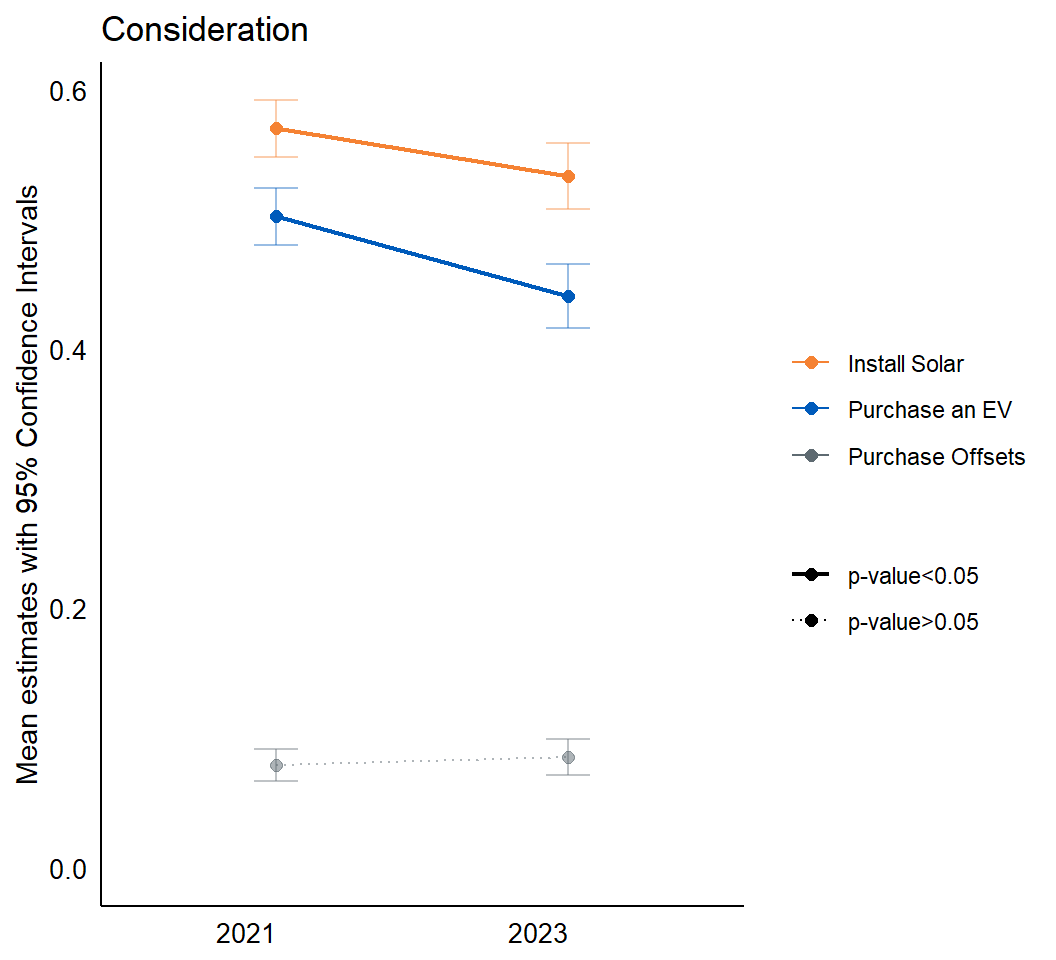
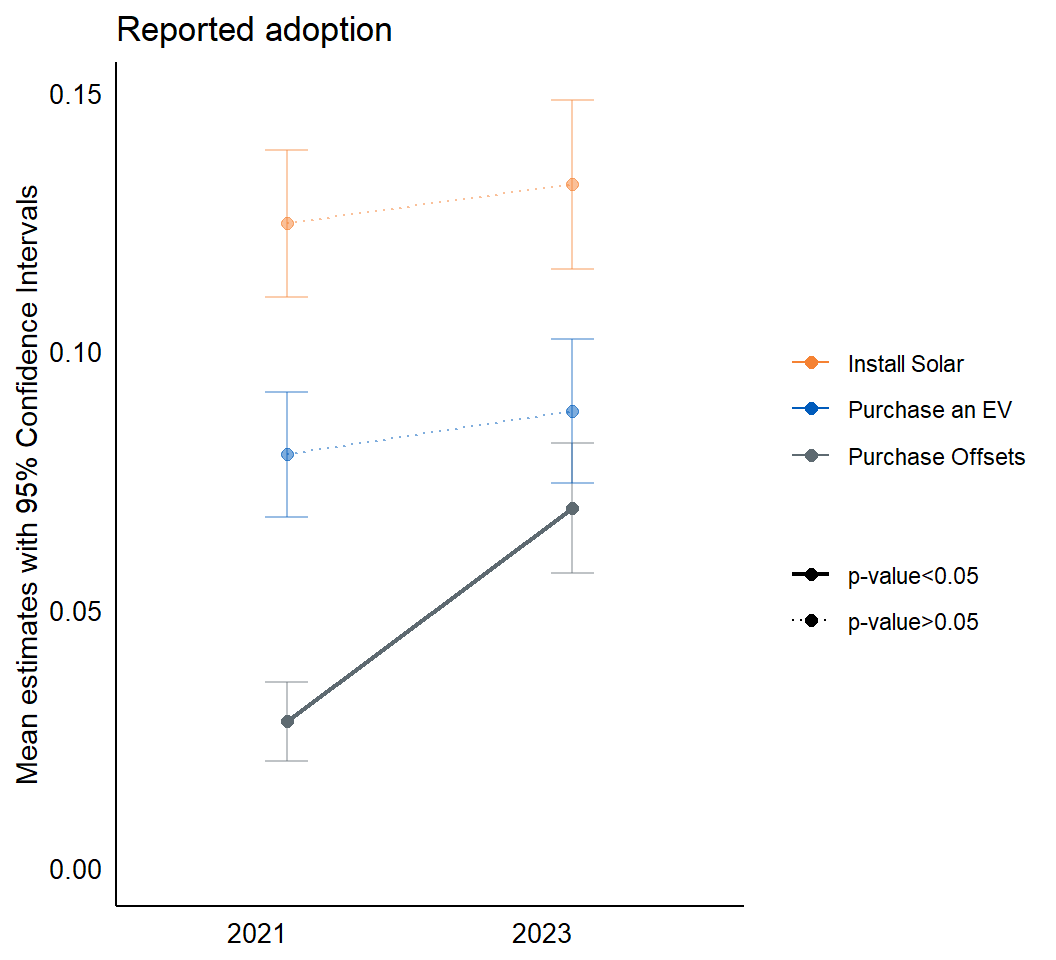
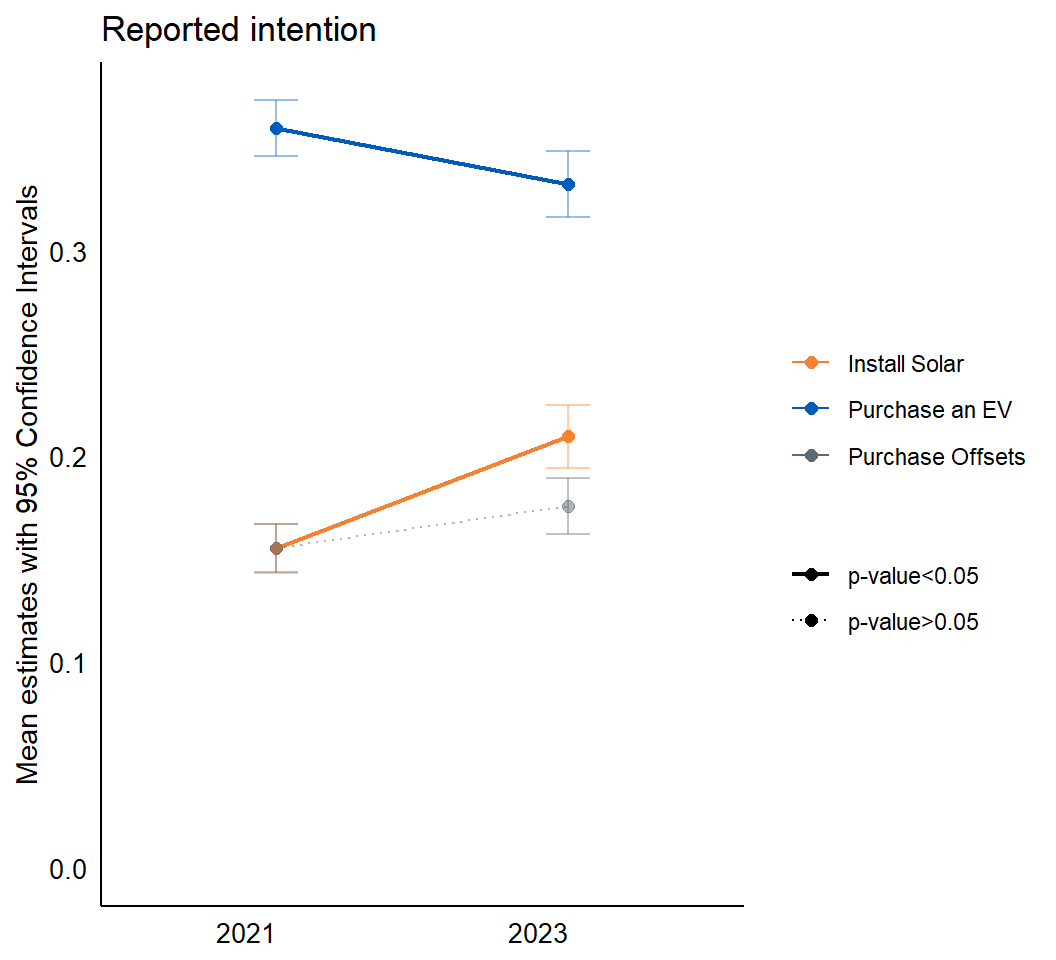
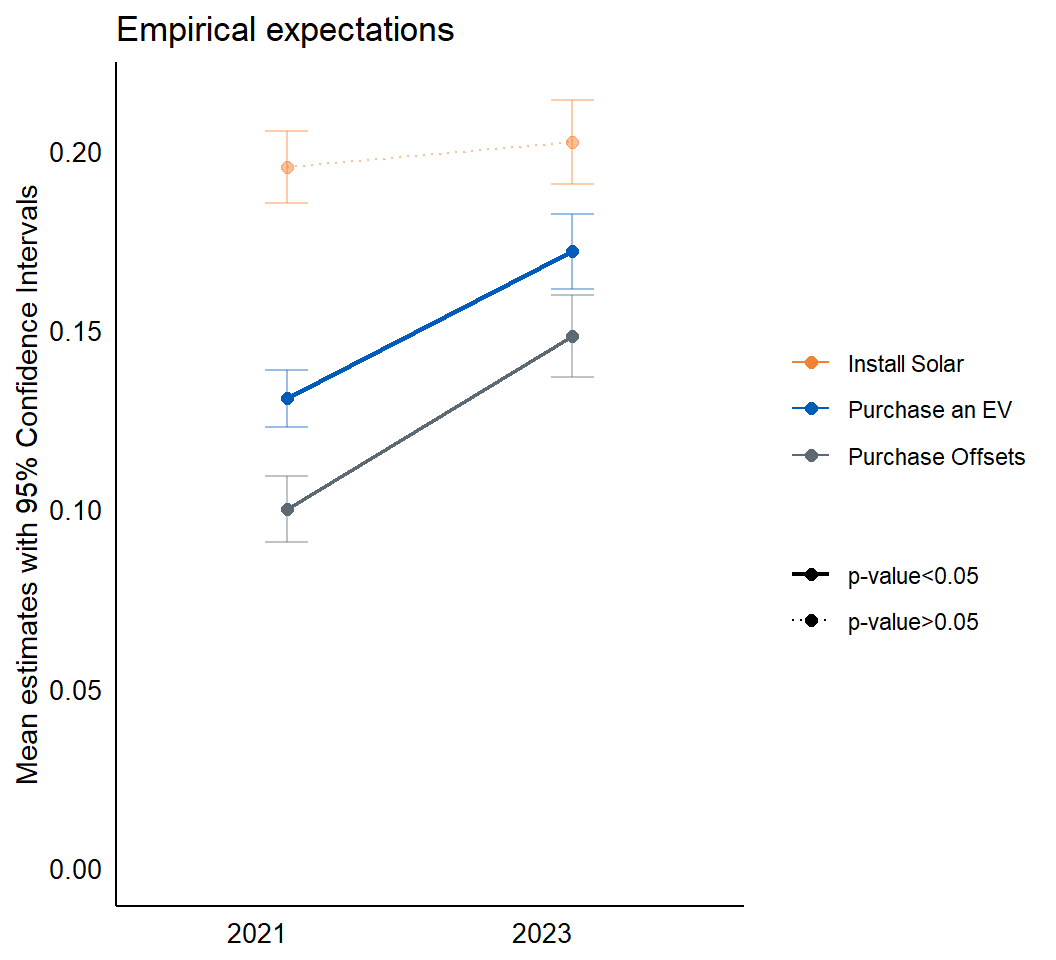
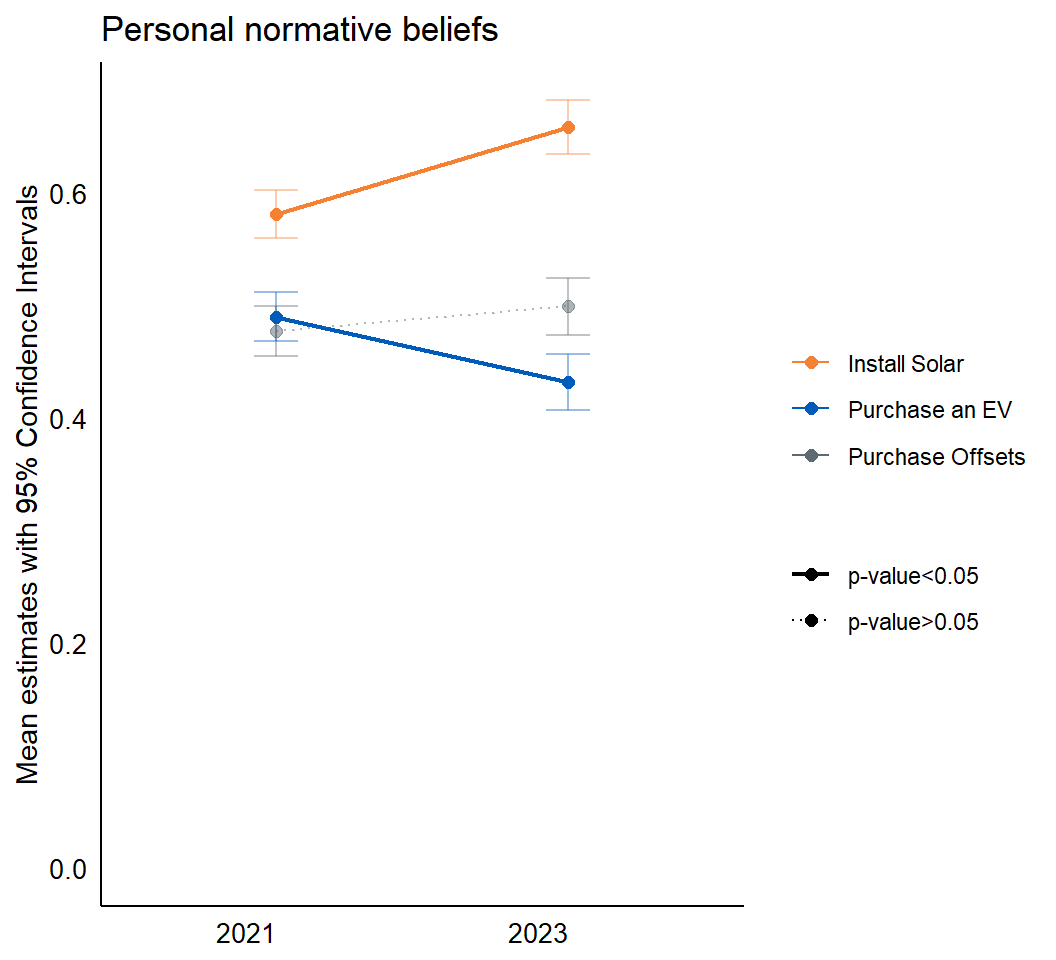
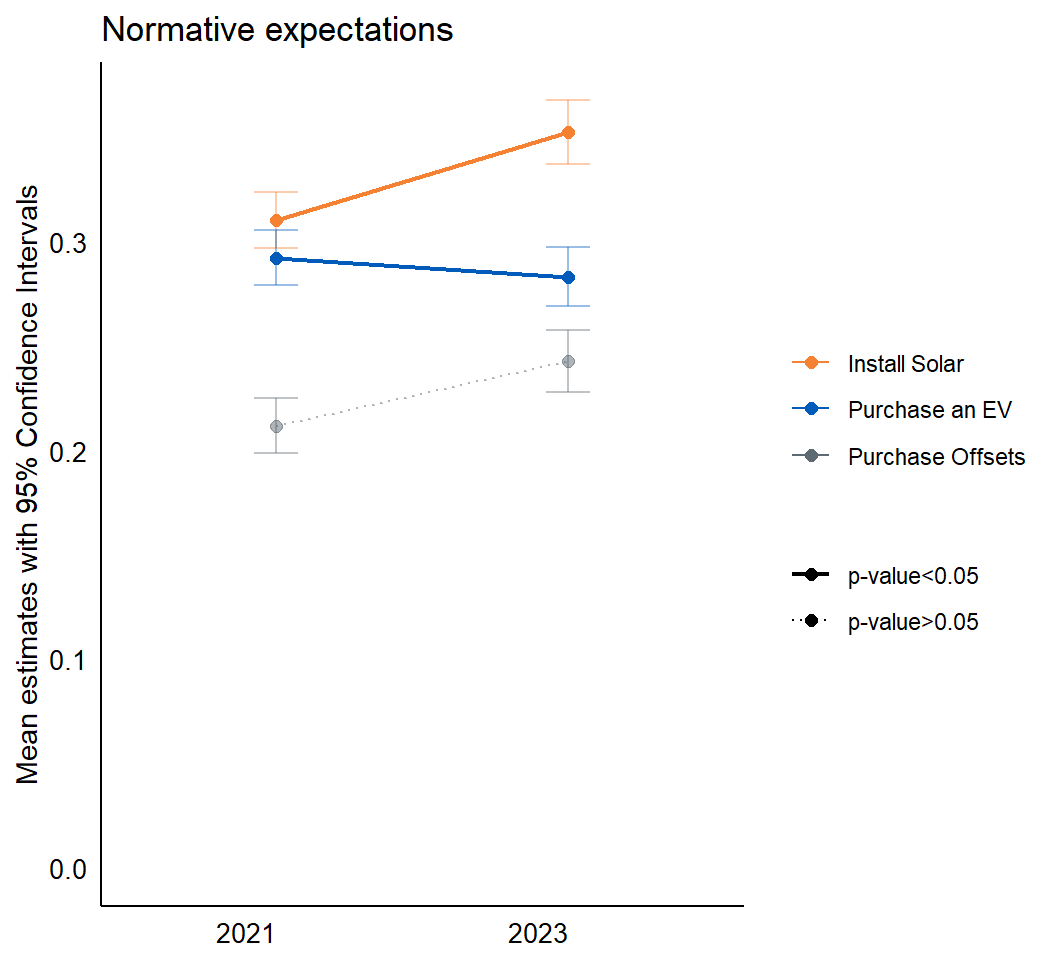
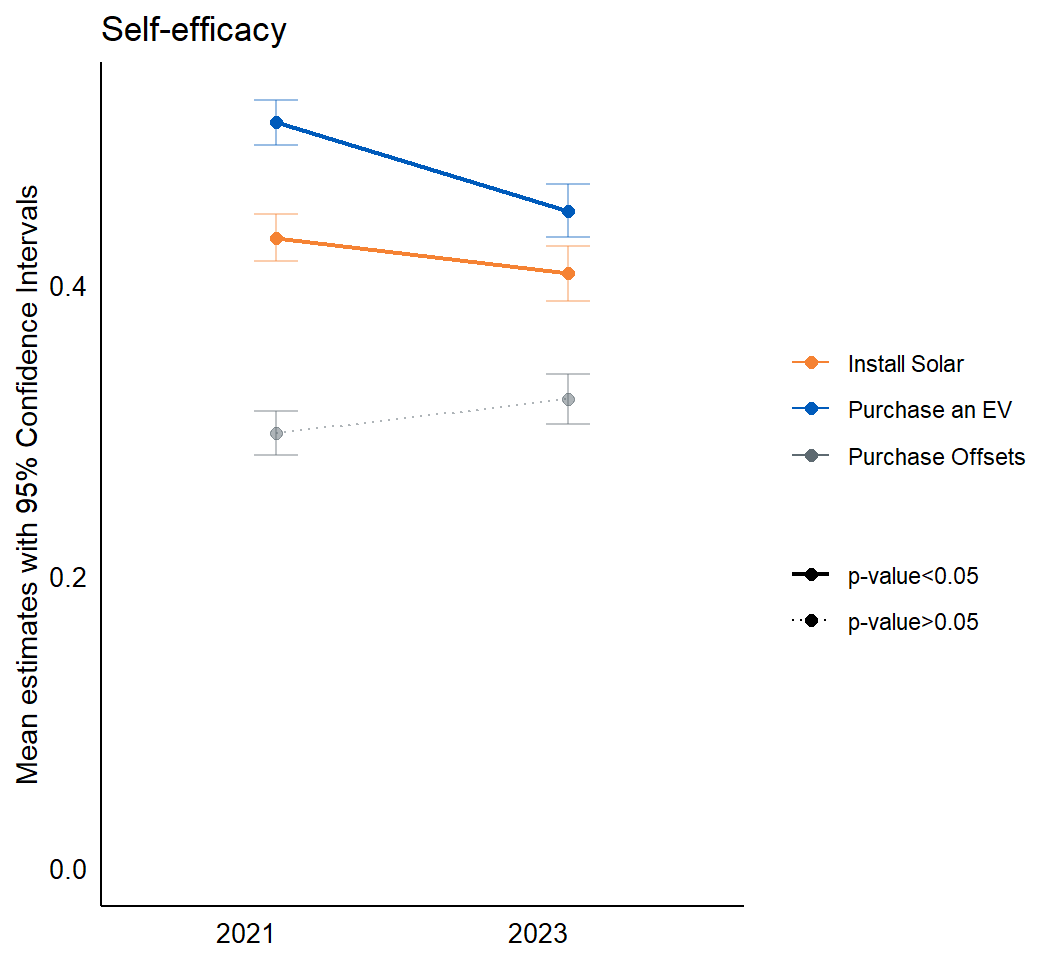
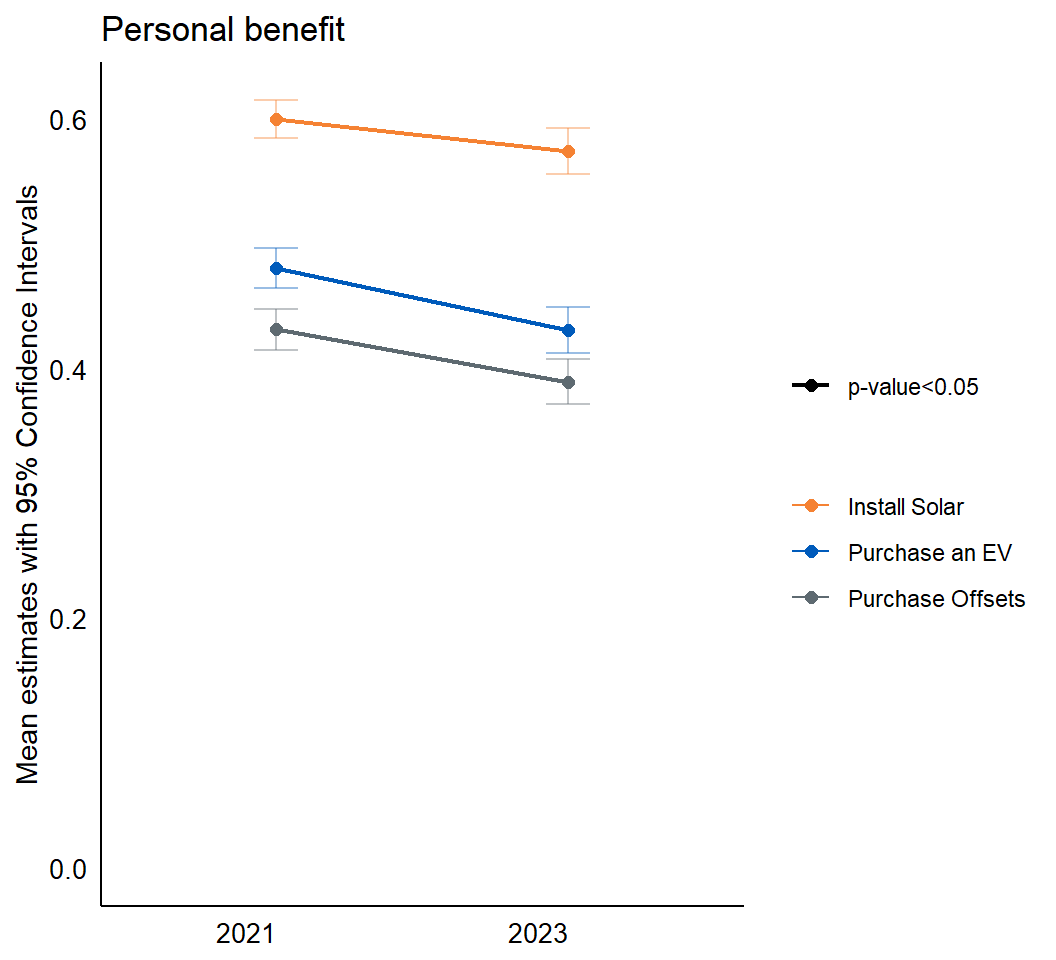
Composite Index
The Normative Gap
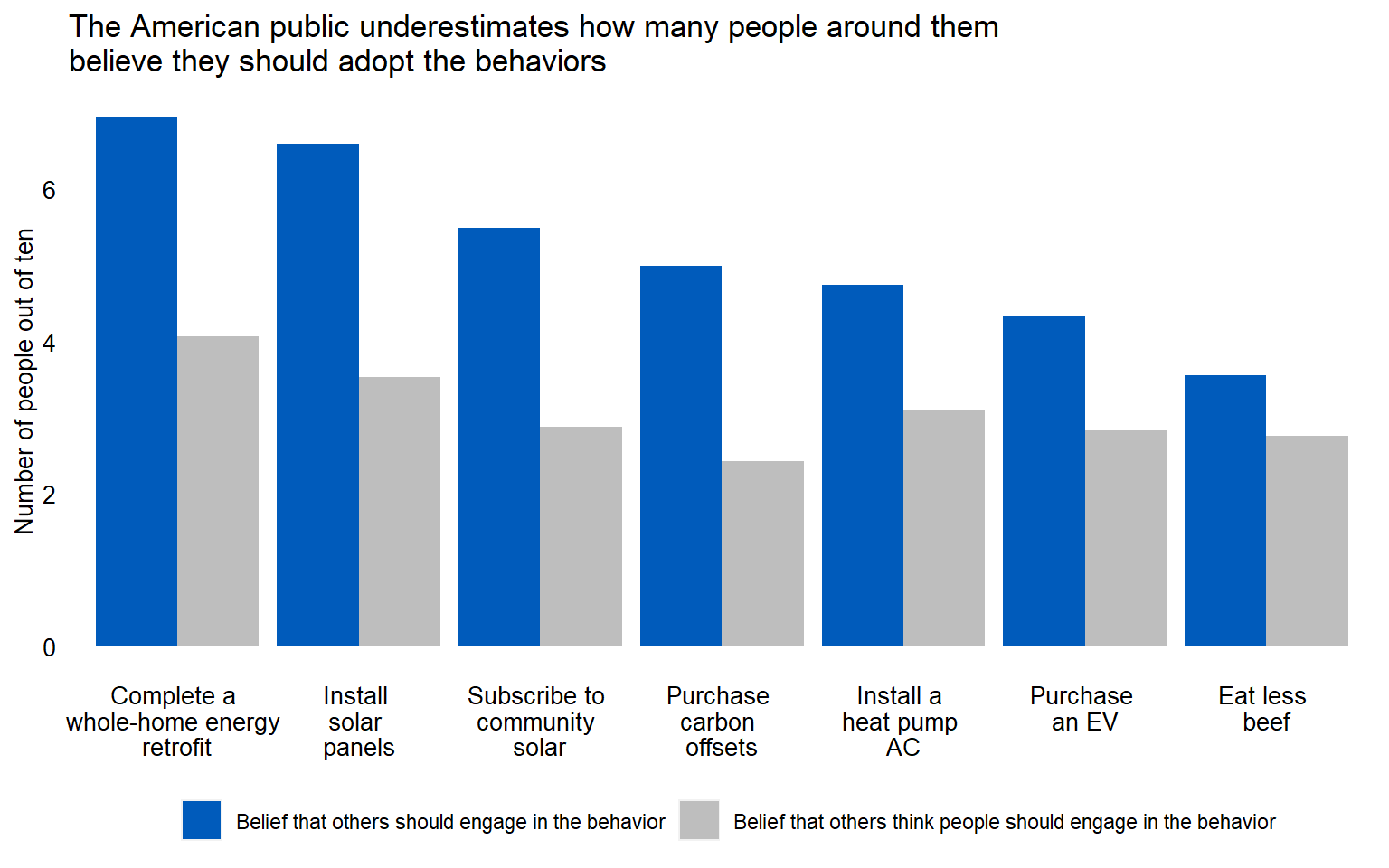
Across all behaviors surveyed, there is a gap between what people believe (Beliefs that others should adopt because it is the right thing to do; personal normative beliefs) and what they think other people believe (Beliefs that others think people should adopt because it is the right thing to do; normative expectations).
Individually, the American public believes that adopting these behaviors is important (normatively correct), however, they underestimate how many other people believe the same. Since normative and empirical expectations were found to be moderate-to-strong unique predictors of intention to engage in climate behaviors (see Exploratory results), interventions that aim to increase the uptake of the behaviors should normalize climate action by making these norms more apparent.